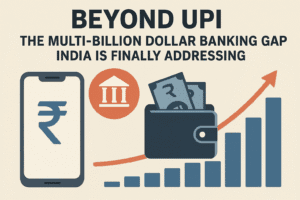Beyond UPI: The Multi-Billion Dollar Banking Gap India is Finally Addressing
While India’s consumer fintech space, led by UPI, has revolutionized digital payments, its corporate banking sector remains decades behind, trapped in manual processes and inefficient workflows. Addressing this gap, Mumbai-based startup TransBnk has raised $25 million to build a unified operating system that integrates with numerous banks. Their platform provides businesses a single window to manage all transaction banking needs, from payments to reconciliation, eliminating cumbersome spreadsheets and multiple logins.
This solution is critical for India’s vast SME market, which has been largely underserved by previous fintech innovation. Demonstrating massive demand, TransBnk has achieved impressive growth and profitability by streamlining financial operations. Their success marks a significant shift towards modernizing the essential, yet overlooked, backbone of India’s economy, unlocking immense potential for business efficiency and growth.

Beyond UPI: The Multi-Billion Dollar Banking Gap India is Finally Addressing
If you’ve used UPI to split a bill, invested through a slick app, or gotten a loan approved in minutes, you’ve witnessed India’s consumer fintech revolution. It’s a world of instant, seamless, digital-first finance. But step into the back office of any small business, lender, or manufacturing firm, and you’ll find a startlingly different reality—one stuck in a time warp of manual processes, clunky bank portals, and endless spreadsheets.
This glaring contradiction is one of India’s biggest untapped economic opportunities. And it’s exactly why TransBnk, a three-year-old Mumbai-based startup, just secured a $25 million Series B round led by Bessemer Venture Partners to build the “operating system” for corporate India’s banking.
The Great Divide: Consumer Tech vs. Corporate Banking
India’s fintech story is legendary, fueled by the government-backed UPI and a wave of innovative payment apps. We have become a global case study in how to digitize consumer finance. However, this innovation has largely stopped at the corporate door.
For a business owner, the experience is far from seamless. Imagine:
- Juggling 10 different internet banking logins for different banks and accounts.
- Manually downloading statements from each portal at the end of the day.
- Spending hours, or even entire days, on a single employee just to reconcile payments in a spreadsheet.
- Managing complex treasury, payroll, or escrow services with no unified view of company finances.
This isn’t a niche problem. India is the world’s largest SME market, with nearly 75 million small and medium enterprises that form the backbone of the economy. Their inefficiency is the economy’s inefficiency.
TransBnk’s Single-Window Solution
Founded by a team of former bankers who lived this pain point firsthand, TransBnk isn’t just another payment gateway. They are building a foundational layer—a “common operating system”—that sits between businesses and the entire banking ecosystem.
Think of it as a universal remote control for all your company’s bank accounts. Through a single interface (be it a web dashboard, mobile app, or APIs), a business can:
- View and manage all its accounts across multiple banks.
- Automate and reconcile payments and collections instantly.
- Build sophisticated services like liquidity management, treasury operations, and escrow solutions on top of this unified data layer.
By doing the heavy lifting of integrating directly with the legacy core banking systems of 40 different banks (and working with 60), TransBnk provides a clean, modern API that businesses and other fintechs can plug into. This is the crucial infrastructure that was missing.
Why Investors Are Betting Big
The numbers reveal a staggering opportunity. India’s B2B fintech space is projected to hit $20 billion by 2030. TransBnk’s traction shows the demand is very real:
- Explosive Growth: They’ve grown their annual recurring revenue more than 12x in the past year to ~$12 million.
- Profitability: A rare feat for a young startup, they turned profitable post-tax in February 2025.
- Scale: They process a massive 110 million transactions monthly across 11,000 bank accounts.
This isn’t just about streamlining operations; it’s about unlocking economic potential. When an SME saves 20 hours a month on manual reconciliation, that’s time spent on growth, innovation, and hiring. When a lender can disburse loans faster with automated verification, it expands credit access.
The Road Ahead: More Than Just Banking
TransBnk’s ambition extends beyond payments. With this funding, they plan to expand into Southeast Asia and the Middle East—markets facing similar corporate banking gaps. They also aim to deepen their reach into verticals like real estate and renewable energy, where complex, high-value transactions are still bogged down by paperwork and trust issues.
Their success signals a broader shift. After a decade of dazzling consumer fintech innovation, the next wave of value creation in India will be less visible but far more profound: building the robust, invisible plumbing that allows Indian businesses to operate with the same speed and efficiency as its consumers.
The question for every business leader is no longer if they will modernize their financial operations, but how soon. The tools to finally leave the spreadsheets behind are now arriving.
You must be logged in to post a comment.